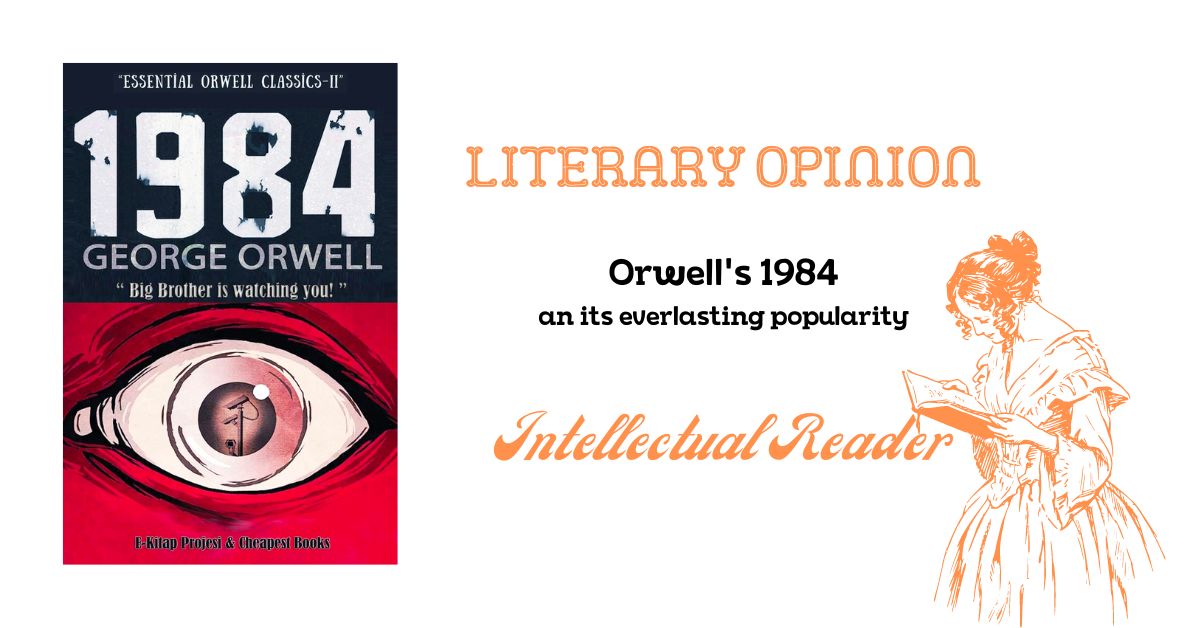Who may forget 1984, the novel by celebrated author George Orwell? The novel became a sensation very soon after its publication. However, the popularity of this novel keeps increasing with every passing year. The fear that the world might be inching towards an authoritarian regime is always there. And as long as this fear remains, the novel will keep striking the consciousness of readers (more than ever). What makes this novel an evergreen work of fiction? Why did I say this work symbolises an ever-lingering dystopia? Why is 1984 by Orwell more than relevant today? In this article, we will discuss these issues briefly.
Before entering into the abyss of conjecture, let’s understand the novel in brief. In the world of 1984, three powerful governments are ruling with total control: Oceania, Eurasia, and Eastasia. In other words, three totalitarian regimes are overpowering the world. Oceania is dominated by the Party, led by Big Brother, who watches over everyone. The Party promotes Ingsoc, an ideology that demands obedience and suppresses individuality. Winston Smith, an ordinary man working for the Party, secretly rebels by keeping a diary and falling in love with Julia. And, as it happens in many instances – The Hunger Games, Terminator, or Divergent – they eventually join the resistance group called the Brotherhood. Also as usually happens thereafter, their actions are discovered, and they are captured. Winston is tortured until he gives up his beliefs and loves Big Brother. And you must remember the famous Room 101 if you are navigating the pages depicting the inhumane and advanced torture. After his release, he is a changed man, stripped of his individuality and critical thinking. George Orwell’s 1984 is a stark warning against the perils of totalitarianism, showcasing how governments can manipulate and control their citizens through surveillance, propaganda, and the suppression of personal freedom. The novel serves as a reminder to always protect our liberty and the right to think independently. Well, you must be thinking of the names of a few countries right now… what are those? If you care, do write the same in the comments section.
Now, let’s discuss what makes this novel ever-popular. Well, there shouldn’t be any doubts that it is the magnum opus of George Orwell! “1984” penetrates the depths of human existence under the oppressive grip of totalitarianism, offering a profound and contemplative narrative. Right from the beginning of this tale, readers have many things to think about. It is an absorbing work that doesn’t let readers break free from the fangs of a chaotic contemplation. The novel adroitly dissects the malevolence inherent in authoritarian regimes, unveiling the relentless tyranny and insidious exploitation perpetrated by such systems. The Party’s despotic dominance, characterized by its calculated manipulation of truth, pervasive surveillance apparatus, and the systematic obliteration of individuality, casts an unrelenting spotlight on the precariousness of unchecked authority. Today’s United States of America or even the recently rising Hydra in the form of Canda are almost the castrated replicas of an Orwellian regime as described in the novel 1984. Linguistically, the novel is very rich with embellishments of prose… to the extent that Orwell’s haunting prose conjures an image of a society ensnared within an inescapable web of ubiquitous surveillance, where the constant vigilance of telescreens subjects every minuscule aspect of citizens’ lives to scrupulous scrutiny, while the unyielding thought police brutally suppress any semblance of dissidence. The novel’s exploration of the implications wrought by perpetual surveillance, with its deleterious effects on personal freedom, the erosion of privacy, and the profound psychological toll it exacts on individuals, serves as a poignant testament to the author’s literary prowess.

The key idea in “1984” is how conveniently truth can be manipulated. And even more, if the party involved in manipulating the truth is powerful as The Party itself or the governments around the world, to be precise. The Party in the story uses a method called “Newspeak” to control and distort reality. Today, we have things like Cambridge Analytica, that in turn manipulates the platforms like Facebook, Twitter, Instagram, Google and other digital spaces widely used by people around the globe. Winston Smith, the main character, works at the Ministry of Truth where he changes historical records to match the Party’s changing story. Do you see? And this is something that happens all the time… everywhere. Orwell shows us the dangerous effects of spreading false information and erasing collective memory. He emphasizes the importance of holding onto truth and historical accuracy.
Orwell delves into the profound depths of psychological manipulation and torment as tools wielded by despots to exert control, exposing the bleak reality that pervades totalitarian regimes. Winston’s harrowing tribulations and subsequent indoctrination by the Party exemplify the extreme measures tyrants employ to suppress dissent and reshape the human psyche. Ultimately, “1984” serves as a portentous cautionary tale, a forceful indictment against political systems that trample upon personal freedoms. Orwell’s poignant opus resounds as an impassioned clarion call for unyielding vigilance, underscoring the imperative of safeguarding democratic ideals and cherishing individual liberty. It endures as an everlasting masterpiece of dystopian literature, resonating as an unflinching reminder of the profound import of safeguarding personal liberties and courageously challenging authority. Also, read – Why you must read dystopian literature?
And with all these qualities and many more that can be added to the list, I believe that Orwell’s 1984 will always remain in the vicinity of common people’s thoughts. The fear of being ruled by fascists and losing every right that we take for granted is a fear that constantly remains in some corner of our minds. And as far as it remains, we will remember, enjoy, and keep reading and interpreting George Orwell’s Gift to the Oppressed – 1984.
By Adarsh J for Intellectual Reader


This was a very compelling read… though I have read George Orwell’s 1984 3 times already, it always brings something new… and this article inspired me to read the novel once more… great article!